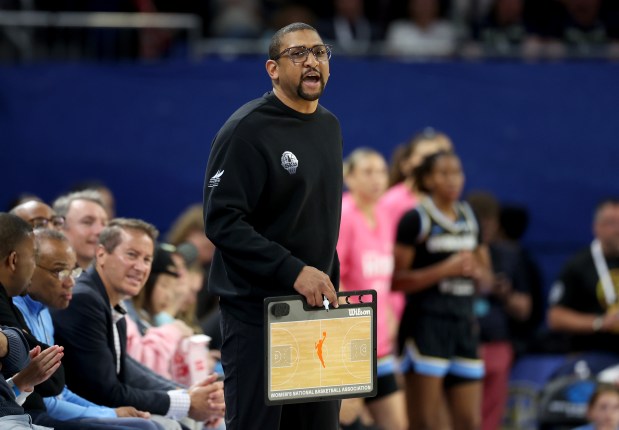Kiana Kelly had three minutes to summarize the last 17 months. The confusion and frustration. The relentless schedule of meetings with special education teachers and tours of therapeutic day schools scattered throughout the Chicago area. The state education board hearings. DCFS probes. A federal restraining order against her 13-year-old son.
Seventeen months of feeling unheard and unwanted, of questions and looks from her children about why they can’t go to school.
Kelly stopped, unable to finish reading the notes she scrawled on paper to read during public comment at February’s North Shore School District 112 board meeting.
Tears trickled down her cheeks.
“I got overwhelmed,” Kelly, 46, said later. “To sit in front of these people and my kids are still not in school … I almost lost it, because it hurts.”
For over a year, two of Kelly’s four children have been caught in the middle of a bitter special education dispute between their parents and the Highland Park/Highwood school district. Hezekiah, 13, has autism and is nonverbal, and has been out of school since June 2023. And with few exceptions, his sister Ke’Asia, 8, also evaluated as having autism, has been without a school since October 2022.
North Shore leaders say the children’s behavioral needs require the relatively rare step of seeking specialized instruction outside of district schools. But, they say the siblings’ parents have repeatedly rejected the district’s exhaustive efforts to meet its legal requirement and place Hezekiah and Ke’Asia, at the district’s expense, in one of the few private therapeutic day schools with space or ability to accept them.
“Any time a child under my care hurts, I hurt. Any time a parent under my care hurts, I hurt,” said District 112 Superintendent Michael Lubelfeld. “I as the superintendent and everybody under my employ in the district wants to support, with a free and appropriate public education, each child every day. Those are not hollow words. So it troubles me that we are in a situation right now that we are in, for a host of very complex and some simple reasons as well.”
Kelly and the children’s father, Fredrick Bass, 51, say their kids are being tossed aside by a school district that is unwilling or unable to properly educate them. Instead, they say, District 112 is trying to force them to accept schools that are too far — some are at least an hour from the family’s Highland Park home, a concerning distance in an emergency for two parents who don’t drive — or that use restraint and isolation tactics they feel are unsafe.
Special education experts say the family’s quarrel with District 112 — while unusual in its duration and intensity — highlights the pitfalls of a special education system stressed by the COVID-19 pandemic, plagued by staff turnover and hampered by a lack of robust training needed to meet behavioral challenges in students.
All this has created gaping holes for vulnerable children to fall through while leaving parents — even the most savvy — lost in a complex maze of special education laws and regulations and curriculum rife with jargon and acronyms.
“This is a very complicated area of law,” said Micki Moran, a veteran special education attorney in Highland Park. “It’s part legal. It’s part relational. It’s part educational philosophy and funding. There are lots of moving parts to this issue.”
The family’s escalating conflict reached an apparent impasse in December when the district notified Kelly and Bass that Hezekiah had been dropped from enrollment in response to his parents’ refusal to send him to a private therapeutic day school in Waukegan, citing their concerns with neighborhood safety and a staff member’s handling of their son during a school visit.
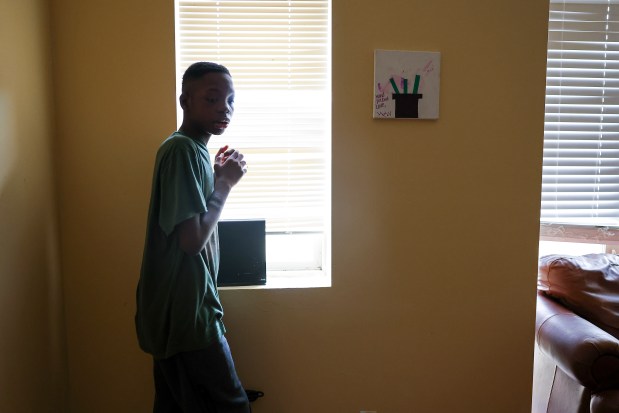
Days later, the district abruptly pulled Ke’Asia from a Northbrook-based private therapeutic education program, two months into her time there, after her parents declined to sign a waiver that would have limited the school district’s liabilities.
In early February, both sides wrapped up a contentious two-day hearing, requested by the district, to ask an Illinois State Board of Education hearing officer to once again weigh in on Ke’Asia’s future education.
The hearing officer ruled the district had met its legal requirements but left unresolved the larger question of where Ke’Asia will attend school. More hearings and possible litigation loom on the horizon.
For the parents and their supporters, the last 17 months have been a stark reminder of wealth and racial disparities in an affluent school district where Black students make up about 2% of the population. District leaders insist race has nothing to do with their treatment of the family. But Kelly and Bass, who said they had to leave Deerfield about a decade ago to escape racism, aren’t convinced.
“They don’t want us here, so they’re coming up with everything just to stop us,” Kelly said. “I just feel like I’m trapped and nothing is being done about it.”
‘I trusted them’
On a blustery cold January morning, Kelly stood outside her family’s three-bedroom apartment on the northern edge of Highland Park and scanned the block for her ride. Her weary gaze revealed an already busy day: Up at 5:30 a.m. Kids dressed. Medicine for Hezekiah and his brother Jeremiah, 10, who also has autism and is nonverbal. Lunch and snacks packed in Jeremiah’s bookbag.
She took Jeremiah’s hand and led him down the snow-covered steps to the waiting school van, double-checking each seat belt strap before smothering him in kisses. Next, she motioned to the window. Ke’Asia emerged seconds later, eyes wide with excitement, hands tucked in the flaps of her gray wolf winter hat.
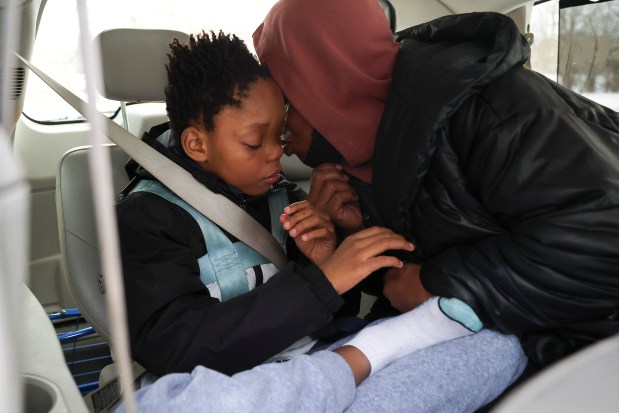
This is a little girl whose personality outsizes her 4-foot-7-inch frame. She’s polite and chatty with strangers. She emulates her older sister and looks after her older brothers. She loves wolves and fills notebooks with drawings of her family and her dog, Starr.
She’s also a little girl with behavioral challenges that have been reportedly too much for nearly a dozen schools in the area.
While Bass stayed home with Hezekiah (Hezzy for short), mom and daughter took a ride-hailing car to Target that morning to buy school supplies: colored pencils, notebook paper, math flashcards and a book about a puppy named Cooper who helps his adopted family’s son, who uses a wheelchair.
Somewhere between raising four children with special needs, she hoped to carve out time to help Ke’Asia put those supplies to use, so her daughter won’t fall even further behind.
It wasn’t always like this.
About 20 years ago, Kelly and her first-born, Jakayla, now 22, moved from Racine, Wisconsin, to a government-subsidized apartment in Deerfield. Their downstairs neighbor had been welcoming at first, Kelly said, but the cordial relationship deteriorated into frequent noise complaints, confrontations at Kelly’s work and calls to police.
“They were horrible to us in Deerfield,” Kelly said.
The conflict drew the attention of housing advocates, who asked the town’s then-mayor to intervene and stop the racial harassment Kelly said her family faced.
Jakayla, then in third grade, struggled at school. Students threw food at her in the lunchroom. A bus driver once told Kelly her daughter had acted up on the way home from school. The truth soon surfaced. Three students hit Jakayla on the bus, took her lunch and backpack and called her poor.
The family wanted out. Housing advocates helped find them their Highland Park apartment in 2011, and Jakayla enrolled in District 112. Her brothers followed her in the district and attended Arbor Academy, a public therapeutic day school that was part of what was then called the Northern Suburban Special Education District (now called True North Educational Cooperative 804), which provides special education to students in 18 north suburban school districts.
“I used to brag about the schools here,” Kelly said. “I couldn’t get enough of Arbor. I trusted them. That was their second home.”
‘It just seems unconscionable’
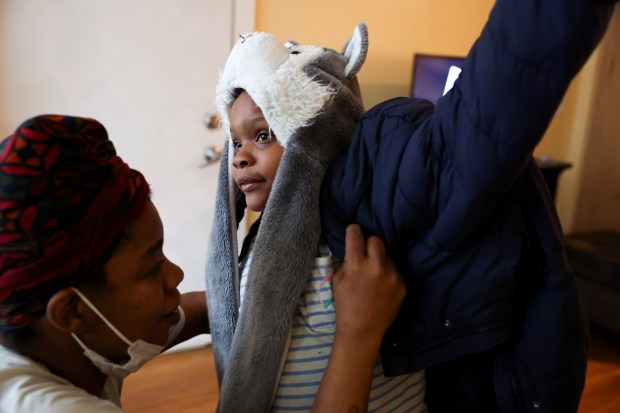
Bass and Kelly’s youngest child, Ke’Asia, started preschool at 3 years old. Her individualized education plan — IEP for short, a legal document that outlines a student’s special education needs — identified her eligibility for special education under a developmental disability category.
She eventually transferred to North Shore Academy Elementary, a public therapeutic day school in the True North collaborative.
In the notes of her IEP meeting from March 2022, staff described her as “a sweet and caring young student. She exhibits a desire to come to school … enjoys playing with her classmates and frequently checks in to make sure others are okay. Ke’Asia seeks out social engagement with peers and staff. She loves to play with animal toys, particularly werewolves.”
They also flagged concerns about her reaction to some staff directions, described as “saying ‘no,’ yelling, throwing items, ripping up work, hitting, kicking, pulling hair, and pinching …”
That behavior appeared to persist as she started first grade. Ke’Asia often required two adults to supervise her throughout the day, records show, and school staff reported having to regularly remove her from class when she tried to hurt herself, her classmates or staff.
A complaint Kelly filed with the state education board noted that Ke’Asia spent four of her nine class periods isolated with staff in an office.
“Isolation is like jail,” Ke’Asia said. “It feels angry and sad. I’m not with friends in a classroom; no having fun and no learning.”
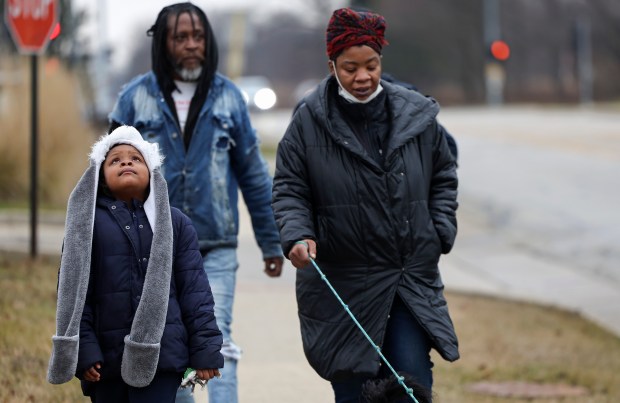
Ke’Asia’s parents said they suspected some of their daughter’s behavior was a result of frequent isolation, or a response to bullying and racist comments from her peers. The latter concern echoed a similar one raised by a group of Black families who recently accused District 112 of failing to address racism at a middle school.
“I try to have hands soft (but) kids are bothering me,” Ke’Asia said. “I couldn’t let them do it to me. So I did the right thing (and) stand up for myself.”
Kelly and Bass also raised alarms with school administrators after Ke’Asia told them she’d been violently restrained by staff and, on one occasion, slapped by a staff member.
Jennifer Cooper-Wells, the principal at North Shore Academy Elementary, testified during the February 2024 state education board hearing that the school and DCFS found no evidence of any staff wrongdoing.
Instead, Cooper-Wells said Ke’Asia caused two staff members to suffer concussions and choked the principal with such force that it took two adults to break the hold.
The school eventually suspended Ke’Asia for three days in September 2022 after a violent outburst. Shortly after her return, another outburst led to a five-day suspension. That same day, Kelly and Bass went to the school for a meeting that never happened.
Instead, Northbrook police were called on Bass. The responding officer wrote in a police report that Bass asked to see his daughter and went to find her, and that the school’s principal and staff “were alarmed by Bass’ aggressive and argumentative behavior.”
“Wells added that on several occasions where meetings such as these have been held, both Bass and (Kelly) become argumentative, accusatory and difficult to deal with,” the officer wrote. “Oftentimes, Bass raises his voice and frightens both Wells and the staff.”
Bass denied any wrongdoing and told the officer the principal first raised her voice at the parents. No arrests were made. A day later, True North mailed Bass a letter barring him from contacting school staff or stepping foot on school grounds for one year.
Kelly and others questioned whether race played a role in the school’s actions that day, something school leaders have denied.
Mary Pike, a retired Highland Park High School aide who has tried to help the Kelly family through their dispute, suggested the police were only called because Bass is “a Black man and he was angry.”
“They wouldn’t have called the police on my husband, a basic old white guy. They just wouldn’t.”
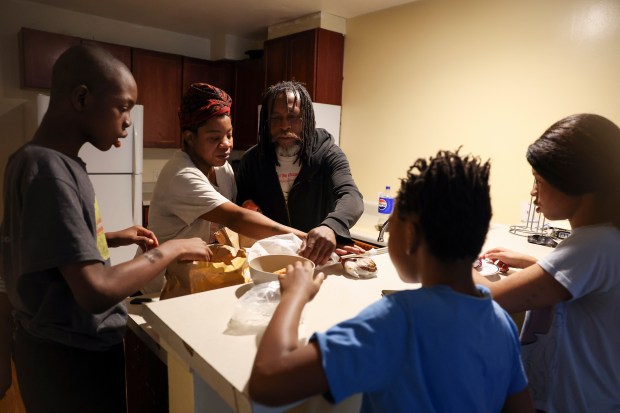
A month after the police incident, school and district administrators met with Ke’Asia’s parents to discuss her future schooling. According to notes from that meeting, everyone agreed that a private therapeutic day school would be the best option. But, with her last day at True North set for Oct. 17, the question of her next school would prove difficult to answer.
District 112 Assistant Superintendent Holly Colin said she sent Ke’Asia’s application to 27 different private therapeutic day schools in the Chicago area. Some said they didn’t have enough staff to support her needs, an issue that has long plagued special education in Illinois.
“Ten years ago, people were pretty heavily staffed and able to hire somebody pretty quickly,” Colin said. “That’s not the landscape today.”
Other schools on the district’s list of options for Ke’Asia were initially rejected by her parents, either because they were too far from their home, they were in neighborhoods Kelly and Bass felt were unsafe or they had isolation rooms that worried the parents.
The use of such rooms in schools across Illinois had been the subject of a 2019 investigation by the Chicago Tribune and ProPublica Illinois. One of the schools the parents rejected, Gages Lake School in Lake County, had been the target of 21 DCFS abuse investigations involving students, according to the investigative series.
In February 2023, four months after Ke’Asia left school, she returned to a classroom. With the help of a state board of education mediator, she enrolled at Black Bear Academy in Chicago.
Her reported behavioral challenges followed. School records document 10 different outbursts against students or teachers in roughly four weeks. By mid-March, Black Bear’s director emailed the district to say that Ke’Asia was no longer welcome at the school.
Kelly and others have trouble reconciling the reports about Ke’Asia’s school behavior with the little girl described by her pediatrician in a letter as a “bright, conversant 7 year old, able to follow directions … a very good historian.”
“It just seems unconscionable that Ke’Asia has been out of school this long,” Pike said. “She has a right to a public education. Our district pays millions of dollars to be part of this special education consortium and they don’t have to adjust and figure out how to educate this child? They call her unsafe? I don’t buy it.”
‘He’s no threat’
The employees at the McDonald’s on Sheridan Road in Highwood all seemed to know Hezekiah Kelly. And so, they weren’t bothered when, on a January afternoon, he opened a storage closet door and then ran behind the counter for a barbecue sauce packet, his favorite of the nugget dipping sauces.
“They don’t always include it,” his father said with a relieved smile, having helped Kelly quickly guide their son to the door.

Hezzy’s IEP described him as “an energetic and passionate 6th grader who is able to obtain new skills quickly.” He enjoyed when staff read to him, the IEP noted, especially “Curious George” and “Pete the Cat” books.
But much like his sister, school staff were worried about his academic progress being hampered by his behavior in class, particularly his fixation on things he wants: a shiny object like a door handle or window latch, or going outside to the playground.
As the 2022-23 school year began at Arbor Academy, Kelly and Bass answered a growing number of phone calls from school staff about their son trying to escape from the building or his transport van. Those attempts could injure staff, who started using gym mats to block his path and protect themselves.
School districts across Illinois rarely seek outside placements, Illinois State Board of Education data show. In each of the last nine years, around 3% of all special education students in the state were placed by their school districts in private therapeutic day schools or out-of-state day programs, ISBE data show. District 112 is no exception.
But in May 2023, with Ke’Asia at home and Hezzy’s escape attempts escalating, the district suggested that Hezzy attend a different school. Kelly and Bass rejected the idea. They felt their son had flourished until True North merged his school with another. Instead of shipping Hezzy someplace else, they argued, administrators should hire and retain experienced staff who know how to work with children like their son.
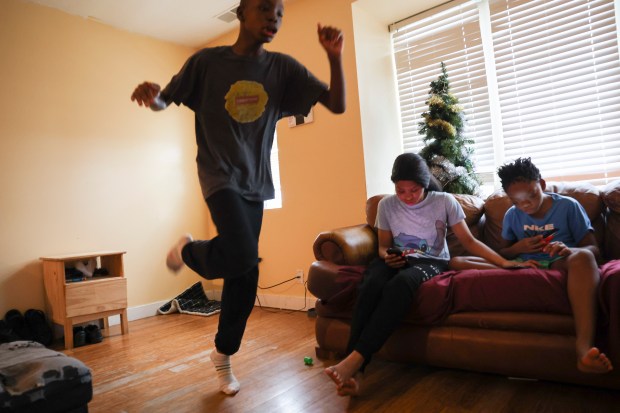
That same month, Arbor suspended Hezzy after he ran from the playground and tried to use a screwdriver to open the front door of a nearby home.
Kelly then filed a due process complaint with ISBE that accused school staff of being overly rough while trying to restrain her son and of denying him the chance to attend school during an extended school year slated to begin in June.
District 112 responded with the unusual step of asking a federal judge to essentially override a state education board “stay put provision” that would have kept Hezzy at Arbor while Kelly’s due process complaint was pending.
Allowing Hezzy to return to Arbor, the district wrote in its federal complaint, “places himself, school staff and other students at imminent risk of danger.”
Kelly acknowledged that her son is tall for his age, and strong. But, she said, “he’s no threat, nothing like what they put in their reports.”
The school and the district, she added, “never wanted to deal with him.”
The judge granted the district’s temporary restraining order and gave it permission to apply to private therapeutic day schools on Hezzy’s behalf. The district sent applications to about two dozen schools in the Chicago area and about as many residential programs, some in other states.

Once again, few schools had the space or a willingness to accept Hezzy.
By November, ISBE dismissed Kelly’s complaint. The federal judge dismissed the temporary restraining order against Hezzy. And one school, Menta Academy North in Waukegan, accepted his application. The next month, Kelly and Hezzy joined district administrators for a tour of the school.
Kelly and Bass were already hesitant to send their son there. They worried about Hezzy escaping into a neighborhood they considered dangerous. He could be confused for a gang member, they feared, or he could encounter a police officer who mistakes the shiny object in Hezzy’s hand for a weapon.
During the Menta tour, Hezzy dropped to the ground, a common reaction when he’s stopped from going where he wants. Kelly said a Menta staff member she described as a “big guy” tried to help Hezzy up, and in doing so repeatedly tried to step on her son’s stocking feet.
Colin, the District 112 assistant superintendent, joined Kelly for the Menta tour and said she saw nothing wrong with the way staff tried to help Hezzy off the ground.
But Kelly had seen enough.
“That right there made me say no,” she said. “I just have a feeling that they would hurt my son.”
About a week before Christmas, Colin emailed Kelly.
Two schools they toured in Chicago could not accept Hezzy, and a third in Palatine put him on a wait list. Menta remained the placement, Colin wrote. “Since you have indicated that you will not send Hezzy to Menta, he will be dropped from the district’s enrollment.”
District leaders later told the Tribune the decision was a technicality, done to ensure he would not be considered truant under state law. Once he’s placed in a school, they said he’ll automatically return to the district’s rolls.
But the effect of that email only served to deepen the family’s fractured relationship with the district. Six days later, it would take another hit.
‘I was so sad that day’
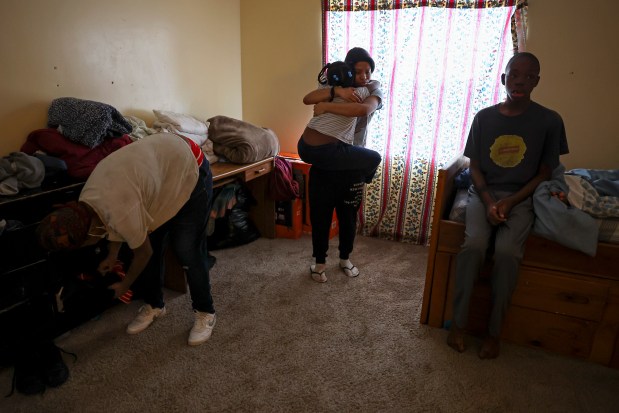
Ke’Asia Kelly summarized her time at Marissa Bennett Consulting like this: “Safe hands. Being nice. Listening to the teacher and paying attention. You can’t forget the last one: Have fun.”
In October, seven months after she was essentially expelled from Black Bear Academy in Chicago, Ke’Asia started working with Bennett and staff at her Northbrook clinic. Her sessions, largely focused on addressing behavioral challenges, gradually increased as she showed progress.
District administrators said they agreed to place Ke’Asia at Bennett’s clinic on a temporary basis while they worked to find an agreeable long-term option for her. Kelly and Bass felt her time there would help gather more information for her IEP that could ultimately open more doors to other schools.
As winter break approached in December, and with an ISBE hearing on the horizon to hopefully resolve questions of Ke’Asia’s IEP and future school placements, Kelly and her attorney met with the district to discuss her continued work at Marissa Bennett.
Menta Academy in Waukegan, the same school that approved Hezzy’s application, said it had an opening for Ke’Asia. But Kelly and Bass continued to reject the placement.
Bennett’s clinic, though, is not subject to the same state oversight as Menta and other ISBE-approved schools. And so, district administrators wanted Kelly to sign a waiver releasing the district from liability (a similar waiver was signed for her to attend Black Bear) before allowing Ke’Asia to continue at the clinic through the end of the 2023-24 school year.
Kelly and her pro bono attorney Jed Stone, a veteran criminal defense lawyer in Waukegan, feared the release gave up too many rights and absolved the district of having to provide Ke’Asia with special education she missed while not in school.

The district would not budge.
Shortly before Christmas, on what would be her last day there, Ke’Asia rode home from Bennett’s clinic. The company’s founder rode with her that day. Both had tears in their eyes.
“I was so sad that day,” Ke’Asia remembered. “That’s not fair to do that.”
‘You have to be strong’
There is no happy ending to this story — at least not yet.
In February, both sides met in a contentious, two-day ISBE due process hearing in which the state hearing officer ruled that District 112 has met its legal obligation to craft an IEP that provides Ke’Asia with a free appropriate public education in the least restrictive environment.
But while the hearing officer determined that Kelly “has refused or obstructed the district’s many efforts to place (Ke’Asia) in a therapeutic placement,” she said she did not have the authority to force Kelly to consent to school applications.
District administrators said they would continue to work toward a legal remedy to get both kids back in school.
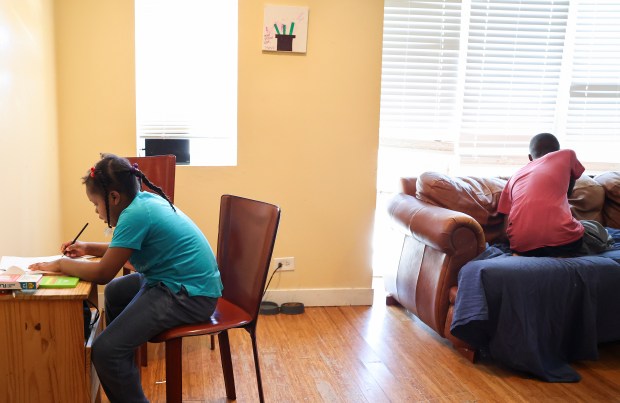
“We are holding zero animus toward the parents or the children,” said Lubelfeld, the district superintendent. “We care for the children and respect the parents. We will continue to seek a professional relationship moving forward.”
But repairing that relationship and ultimately finding a school for Hezzy and Ke’Asia will undoubtedly be difficult.
“There’s a shortage of placements for these kids,” said Moran, the special education attorney. “It’s not like it’s a world of infinite possibilities. It just isn’t. Not every kid can go to their home school. The law is super clear about that.”
Back in November, Kelly and Bass received a letter from DCFS saying they were being investigated for suspected medical neglect. Kelly said she was told their 10-year-old son, Jeremiah, who suffers from seizures, repeatedly threw up at school. Bass was the target of a second DCFS probe after the district reported his alleged handling of Hezzy during a school tour late last year.
Both complaints were deemed unfounded, records show. Still, Kelly and Bass said they were stung by the accusations and concerned the report about Jeremiah was the first step toward trying to remove him from school.
“The whole thing is to just erase my kids from their district,” Bass said. “It’s been progressively and systematically happening. No matter what we do, no one is hearing us.”
The children’s extended absence from school has taken a toll on the family.
Bass said he’s put off medical screenings and taken time off work to be home. His boss at a Chicago landscaping company also has a child with autism, Bass said, and has been understanding. Kelly is afraid she’ll lose her job at a home health care company because she keeps turning down shifts to be with her children or to attend meetings about their continued education.
Jakayla lends a hand when she’s not in school or at her part-time job. Still, Kelly and Bass want to make sure she doesn’t take on too much at the expense of her own life. She wants to find an apartment of her own, make friends and get a nose ring and a tattoo (Bass is not sold on the latter).

“We’ve put a lot of stuff on hold because somebody has to be here with them,” Kelly said. “And I feel the district is responsible for this because they kicked them out of school. That’s not how it should be with kids’ education. We pay taxes. Our taxes go toward the school, and these kids are not getting their education.”
Hezzy watches PBS on a phone and wanders from room to room, often with Jakayla at his side. He holds up his shoe or points to the door when he wants to leave the apartment. And when the weather allows, the family walks with him to the gas station across the street (he loves barbecue chips and SweeTarts) or to a nearby park.
They try to keep him away from the living room window most mornings. At times throughout the last eight months, he would run to the couch near that window and watch Jeremiah get on the van that used to take the siblings to school. He’d get so agitated about not going with, his parents said, that he’d pull at his teeth or bite his arm.
As for Ke’Asia, she’ll often pick up her backpack and ask her parents when she can go back to school. Other times, she lines up her dolls and her favorite toy — a 6-inch plastic wolf named “Wolfy” — and pretends she’s their teacher.
One January morning, sitting on the living room couch, she told her mom she might want to be a teacher when she gets older. Or maybe a veterinarian. Or a doctor.
“I’ll take care of you mommy, so you’re healthy,” she said, grasping Kelly’s hand. “You have to be strong.”




